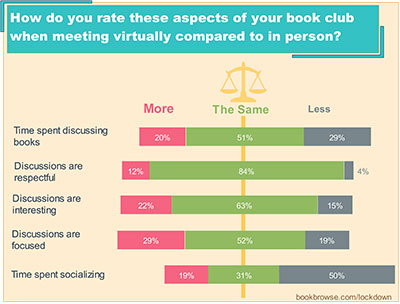 In the previous post about meeting virtually, we talked about how switching to a virtual format has changed some key factors for book clubs. Many respondents to our "Book Clubs in Lockdown" survey focused on the positive aspects of these changes, such as welcoming back members who had moved away and could now take part in meetings over Zoom. Others missed getting together in person and bonding over group meals and drinks.
In the previous post about meeting virtually, we talked about how switching to a virtual format has changed some key factors for book clubs. Many respondents to our "Book Clubs in Lockdown" survey focused on the positive aspects of these changes, such as welcoming back members who had moved away and could now take part in meetings over Zoom. Others missed getting together in person and bonding over group meals and drinks.
But first and foremost, book clubs meet to discuss books. So, how are these book discussions actually taking shape when a group is meeting virtually?
One-fifth of respondents whose book clubs have been meeting virtually say their discussions have been longer than when they met in person before the pandemic. Common reasons include fewer demands on their time and that the virtual format has caused their group to shift some of their social time to discussion.
29% of respondents say their discussions have generally been shorter. A common reason for this is that the group is using the free version of Zoom which restricts meetings of three or more people to 40-minutes.
In earlier research studies, we've found that the most popular discussion length for a book club is 50-60 minutes, with many spending considerably longer, so being limited to 40-minutes has been a frustration. Some groups are fortunate to have a member who has a paid Zoom subscription or they have pooled together to pay for one; some groups simply schedule back-to-back meetings, so when the first 40-minute meeting times out, they move to the next.
We are more respectful of time since we are using a free Zoom account, which has a time limit. We've worked around the short time by scheduling two meetings separated by a one-minute gap.
Significant numbers of respondents note that they feel there is a lack of spontaneity in Zoom discussions. The virtual format tends to require each person to wait their turn to speak, whereas in-person conversations can develop more organically, with participants piping up whenever they feel inclined to comment.
Spontaneity is alive and well when meeting in person. It's nearly impossible in Zoom meetings. We are friends first, so we miss being able to share personal conversations in the limited time available on Zoom.
That said, others observe that there are distinct advantages to the virtual format, especially for members who may be a little hesitant to speak up in a large group.
Being virtual there seems to be an understanding that the person speaking gets full attention. So less interrupting and less wandering off topic.
Some of the quieter people have participated more via Zoom than they did in person. There are fewer side conversations between people since all the discussion is available to all. We stay on task more. But that is also sad, because there is less conversation. It feels more like a class than a discussion.
While 19% say that they feel their group's discussions are less focused on Zoom, 29% feel they are more focused than they used to be in-person; and with less time spent socializing, some find they are having leaner, more concentrated meetings that can result in deeper conversations.
Our meetings are shorter and more focused during the pandemic. We spend more time actually discussing the book we read for that month.
Some have commented that they like the virtual meetings because the discussions stay on topic, and I have noticed the difference of fewer distracting sidebar conversations.
Of course, some have had the opposite experience. Anytime technology is introduced into the mix, there are bound to be some glitches and stumbling blocks along the way.
Zoom has made our exchanges more awkward—there is always someone who can't hear, the camera is wonky or they are just frustrated with the format.
As already mentioned, based on our past research, the great majority of book clubs spend at least 40 minutes focused on book discussion, and spend more of their meeting time on discussion than they do on socializing. But even the most dedicated book groups generally carve out at least a few minutes for social time.
About half of the respondents in book clubs meeting virtually say that their group is spending less time socializing. What's interesting is that opinions vary as to whether this is positive or negative to their book group experience.
Some miss the communal aspect of sharing food and drink in a convivial location, and the absence of this was a common factor for cutting back on social time:
Fewer people participate with Zoom. The socializing part of it has definitely changed. We aren't able to do our themed food and drink. Not much we can do about it.
Miss meeting in person; miss having the time to socialize in addition to our book discussions. We miss our hugs, miss the relaxed atmosphere when sharing food and beverage, miss the warmth and ambiance of homes and hearths.
However, others observe that their Zoom meetings are more focused on book discussion, with some also noting that their group had gotten smaller due to some members opting out of the virtual format, resulting in more satisfying discussions.
Too many people before made it difficult to have in-depth discussions as the moderator was busy trying to make sure everybody had a chance to contribute, and some were more interested in socializing anyway. The group is smaller now so we can get more stuck in.
I think our meetings are more focused on the actual book & discussing it vs. socializing at a restaurant.
Whether you love it or hate it, if your book club is meeting on Zoom, there may be at least one or two changes you've made as a result of the experience that you'll want to maintain as and when you return to in-person meetings. As you might recall if you read our earlier post, Book Clubs During COVID: When Will We Meet Again?, a third of those who have been meeting virtually expect to retain a virtual element in the future. Of these, three percent expect to stay completely virtual; the remainder envisage a hybrid arrangement. For example, sometimes all the group would meet in person, while at other times (for example, during bad weather) they would all meet virtually; or if a member was sick or traveling and thus unable to join an in-person meeting, they would have the option to participate virtually.
With the COVID-19 vaccine becoming more widely available, book clubs will be able to make the choices that are right for them. Before too long, let us hope that the quarter of respondents to our October 2020 survey who said that their book club had not been meeting during the pandemic will be able to reconvene with their group. And those that have been meeting in a variety of new and different ways during the pandemic will be able to return to their old meeting format, while retaining some of the positive experiences and learnings from this unique time in our lives.
---Davina, BookBrowse Publisher
 The findings in this article are drawn from our published research: The Inner Lives of Book Clubs and/or Book Clubs in Lockdown. More about both at bookbrowse.com/wp.
The findings in this article are drawn from our published research: The Inner Lives of Book Clubs and/or Book Clubs in Lockdown. More about both at bookbrowse.com/wp.
You can see more articles in The Inner Lives of Book Clubs section of this blog; and receive future articles in your mailbox by subscribing to our newsletters, in particular Book Club News or Librarian News.
And if you're looking for an expert on book clubs for interview, please contact us!